The high-performance EMF radiation detector is used to test the radiation generated during X-ray examinations. It has a dual warning of sound and light. If it exceeds the safety value, it will automatically alarm and light up the red screen. SISCO handheld radiation detector is used for residential, office, outdoor, and industrial monitoring.
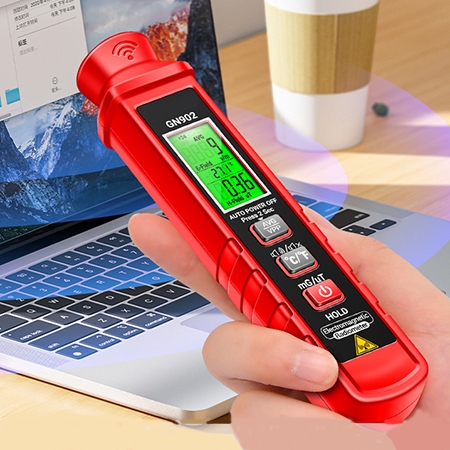
Red screen with automatic alarm for exceeding the safe value
- The electromagnetic radiation detector is equipped with an automatic alarm that activates when radiation levels exceed pre-set safety thresholds, ensuring users are immediately alerted to potential hazards.
- When radiation levels surpass the safe limit, the screen turns red, providing a clear and highly visible warning that immediate action is required.
- In addition to the red screen, the device also offers audible and visual alarms, ensuring that users are notified through multiple channels for maximum safety in any environment.
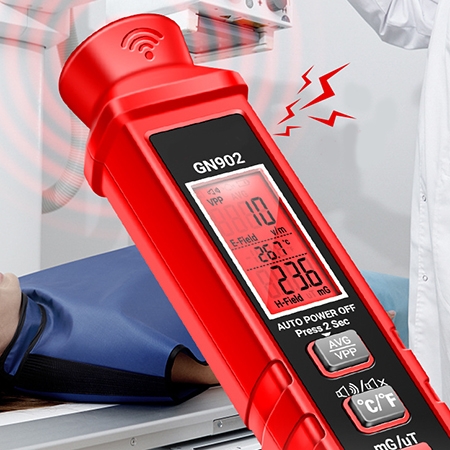
Display detection, radiation has no place to hide
- The radiation detector features a high-visibility screen that provides real-time readings of radiation levels, ensuring users can monitor exposure accurately and with ease.
- The advanced detection technology ensures that even low-level radiation is identified, allowing users to assess their environment thoroughly and take action as needed.
- The device's sensitive sensors and clear display make it easy to detect hidden sources of radiation, offering peace of mind that no radiation goes undetected.
Dimension
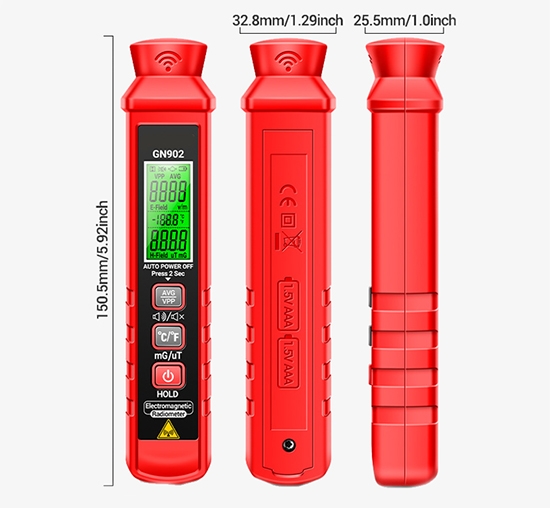
Applications
SISCO radiation detector is a device used to detect and measure ionizing radiation, such as alpha, beta, gamma rays, and neutrons. Radiation detectors are used in medical imaging, industrial safety, environmental monitoring, and security to measure ionizing radiation. They help ensure safe radiation levels, detect contamination, and prevent the unauthorized transport of radioactive materials. They’re also crucial in scientific research for studying radiation effects.

Environmental

Security

Industrial
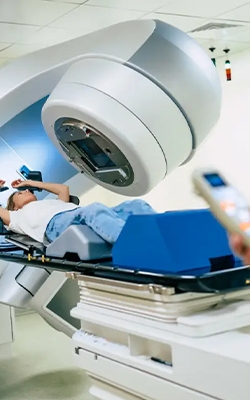
Medical
| Model | SISCO-RD-GN902 | |
| / | Electric Field | Magnetic Fields |
| Unit | V/m | μT |
| Accuracy | 1 V/m | 0.01 μT |
| Measuring Range | 1 V/m-1999 V/m | 0.01 μT-99.99 μT |
| Alarm Threshold | 40 V/m | 0.04 μT |
| Display | LCD backlit screen | |
| Unit Switch | uT/mG, ℃/℉ | |
| Operating Voltage | 3V | |
| Operating Temperature | 0℃-50℃ | |
| Operating Humidity | Relative humidity 80% or less | |
| Overload Indication | LCD display of range maximum value | |
| Reading Display | 3-1/2 digit LCD display | |
| Test Bandwidth | 5Hz-3500MHz | |
| Sampling Time | Approx. 0.4 seconds | |
| Test Mode | Average/Peak Mode | |
| Beep Switch | √ | |
| Low Battery Indication | √ | |
| Data Hold | √ | |
| Auto Power Off | √ | |
| Sound and Light Alarm | √ | |
| Size | 150.5*32.8*25.5mm | |
| Weight | 60g | |
Detail
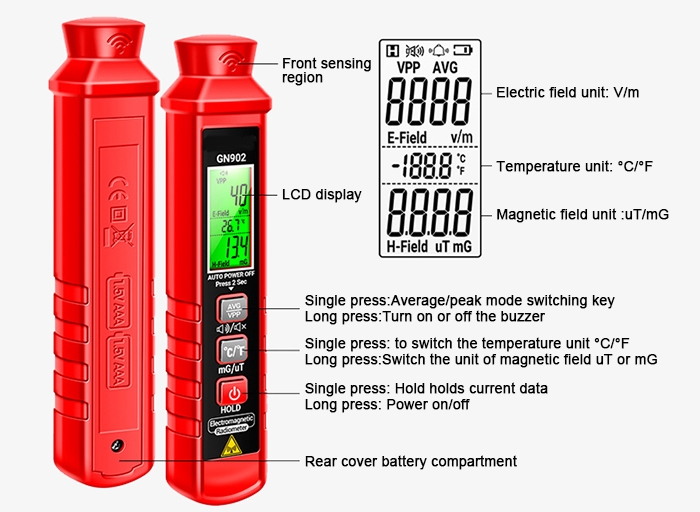
Q1: What is a radiation detector?
A1: A radiation detector is a device designed to detect and measure ionizing radiation, such as alpha, beta, gamma rays, and neutrons. These detectors work by sensing the interaction of radiation with matter, often producing an electrical signal that correlates with the intensity or type of radiation present. Radiation detectors come in various types, including Geiger-Müller counters, scintillation detectors, and solid-state detectors, each tailored to detect different forms of radiation or provide varying levels of sensitivity.
Q2: Do radiation detectors need calibration?
A2: Yes, radiation detectors need regular calibration to ensure accurate and reliable measurements. Calibration involves adjusting the detector to account for any changes in its performance over time, which can be caused by factors such as aging components, environmental conditions, or variations in detector sensitivity. Regular calibration helps maintain the accuracy of the readings and ensures that the detector provides precise data for assessing radiation levels. Calibration is typically performed using known radiation sources and may be required by regulatory standards to ensure compliance and safety.
Q3: Can radiation detectors detect non-ionizing radiation?
A3: Most radiation detectors are designed to detect ionizing radiation, such as alpha, beta, gamma rays, and neutrons. Non-ionizing radiation, which includes radio waves, microwaves, infrared, and visible light, requires different types of sensors. For example:
- Radio frequency (RF) meters and electromagnetic field (EMF) meters are used to measure non-ionizing radiation like radio waves and microwaves.
- Photodetectors (such as photodiodes) measure visible light, while infrared sensors detect infrared radiation.
Tips: How often should I use an electromagnetic radiation detector?
How often you should use an electromagnetic radiation detector depends on the environment and the sources of radiation present. In homes or offices with common electronic devices (like Wi-Fi routers, computers, or microwaves), occasional monitoring—every few months or when new devices are added—can help ensure that electromagnetic field (EMF) levels remain within safe limits. In industrial or professional settings, where high-powered equipment or strong EMF sources are present, more frequent monitoring is recommended to maintain safety standards, potentially on a monthly or even weekly basis. Regular checks are especially important in environments where EMF exposure may fluctuate.
Thank you for buying industrial test and measurement equipment on SISCO.com, all products sold by SISCO and the partner cover a 12 months warranty, effective from the date of receiving the products.
What is covered?
SISCO is responsible for providing free spare parts, and free technical support to assist the customer to repair the defective products until the problem is solved.
What is not covered?
- Product purchased from anyone other than a SISCO store or a SISCO authorized reseller.
- Expendable parts.
- Routine cleaning or normal cosmetic and mechanical wear.
- Damage from misuse, abuse or neglect.
- Damage from use of parts other than SISCO approved.
- Damage from use outside the product’s usage or storage parameters.
- Damage from use of parts not sold by SISCO.
- Damage from modification or incorporation into other products.
- Damage from repair or replacement of warranted parts by a service provider other than a SISCO authorized service provider.
- Damage caused by the application environment not meeting the product usage requirements and the failure to perform preventive maintenance.

